|
|
|
Sort Order |
|
|
|
Items / Page
|
|
|
|
|
|
|
| Srl | Item |
| 1 |
ID:
132051


|
|
|
|
|
| Publication |
2014.
|
| Summary/Abstract |
With governments increasingly contracting private military and security companies (PMSCs) to perform military and police-related tasks, international relations scholars have made attempts to better understand PMSCs and to investigate the reasons for the boom of private security. Rather than focusing on the services these companies offer, which has been a common approach, we offer an identity-based explanation for their surge. We show that PMSCs eclectically assume identities related to the military, business managers and humanitarians, independent of the services they perform, their market segment or their location on the battlefield. This finding points to an important yet little-noted dimension in the private security industry. Although companies are heterogeneous, they also appear increasingly homogeneous because they incorporate a similar set of identities. On the one hand, this enables PMSCs to adapt to any context, client or employee, and, on the other hand, it has constitutive qualities, contributing to an important source of power for the respective companies. These multiple identities contribute to a norm of what a superior security provider should look like.
|
|
|
|
|
|
|
|
|
|
|
|
|
|
|
|
| 2 |
ID:
132052
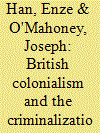

|
|
|
|
|
| Publication |
2014.
|
| Summary/Abstract |
What explains the global variation in laws criminalizing homosexual conduct? Recent research has claimed that British colonialism is largely responsible for the criminalization of homosexuality around the world. This article utilizes a newly constructed dataset that includes up-to-date data on 185 countries to assess this claim. We find that British colonies are much more likely to have criminalization of homosexual conduct laws than other colonies or other states in general. This result holds after controlling for other variables that might be expected to influence the likelihood of repressive lesbian, gay, bisexual and transgender (LGBT) rights legislation. However, we also find that the evidence in favour of the claim that British imperialism 'poisoned' societies against homosexuality is weak. British colonies do not systematically take longer to decriminalize homosexual conduct than other European colonies.
|
|
|
|
|
|
|
|
|
|
|
|
|
|
|
|
| 3 |
ID:
132054


|
|
|
|
|
| Publication |
2014.
|
| Summary/Abstract |
Natural disasters have become a heightened security issue in the last decade. Mitigating and responding to disasters, such as the 2004 tsunami in Southeast Asia and the 2011 earthquake in Japan, reflect a new security agenda that has spread across the globe and infiltrated most regional organizations. At first glance, the creation of regional programmes on disaster risk management (DRM) appears to be driven by the functional preferences of states. However, a comparison of ten regional organizations reveals some curious ambiguities. Despite different threat perceptions, financial budgets and geographical environments of regional organizations, a majority of states have formed DRM programmes that exhibit highly standardized features in terms of language, the referent points of protection and the apparent motivations for cooperation. World society theory is used to explain these striking similarities with reference to the global cultural system. This article also illustrates the analytical purchase of world society theory in understanding cooperation through regional organizations.
|
|
|
|
|
|
|
|
|
|
|
|
|
|
|
|
| 4 |
ID:
132053
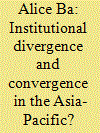

|
|
|
|
|
| Publication |
2014.
|
| Summary/Abstract |
This paper gives attention to the geopolitics related to the Association of Southeast Asian Nations (ASEAN) as an alternative model of regionalism in theory and practice. Offering a rough periodization of ASEAN in IR theory, it considers interacting theoretical and empirical developments, and their geopolitics as one way to think about, first, ASEAN, its defining dynamics and processes of change, and, second, ASEAN's relationship to a larger IR theory literature defined by US preoccupations and the institutional trajectory of the European Union. Three periods are considered: a Cold War period, when ASEAN norms and practices developed relatively insulated from great power expectations and theorizing about ASEAN was minimal; the 1990s, when constructivist theorizing encouraged new thinking about alternative institutional models; and the 2000s, a period characterized by correlating great power pressures and a 'functional' turn in academic and theoretical debates about ASEAN. Special attention is given to the United States as a major, leading actor in both world politics and the institutionalization of international relations as a discipline, as well as the possibilities and constraints of institutional divergence in theory and practice.
|
|
|
|
|
|
|
|
|
|
|
|
|
|
|
|
| 5 |
ID:
132049


|
|
|
|
|
| Publication |
2014.
|
| Summary/Abstract |
In examining the failure of the 2002 peace process between the Sri Lankan government and the Liberation Tigers of Tamil Eelam (LTTE), this essay argues for the need to go beyond the power dynamics of the local actors. The peace process was dismantled and military victory by the Sri Lankan government made possible not so much by the Sinhala nationalist discourse, which opposed administration of development aid by the LTTE, as by the global security discourse associated with geo-strategic interests. The EU-led development discourse, which was informed by the liberal internationalist ethos, could have facilitated resolution and transformation of the conflict. In its place a security-based, realist discourse was prioritized in South Asia by the UK and US governments, particularly after the invasions of Afghanistan and Iraq. This was the discourse which provided the material basis for the Sinhala nationalists to consolidate their power in pursuing a military victory. The post-war era is marked by geopoliticization of the human rights discourse, deepening the conflict. This essay explores the correlation between the liberal peace model, human rights, international relations and geopolitics.
|
|
|
|
|
|
|
|
|
|
|
|
|
|
|
|
| 6 |
ID:
132056
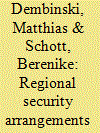

|
|
|
|
|
| Publication |
2014.
|
| Summary/Abstract |
Regional security arrangements play a central role in modifying emerging norms as they travel from the global to the local level. This process of norm localization is shaped by various factors such as the characteristics of regional security cultures, corresponding resonance with the emerging norm, institutional voice opportunities, and mechanisms of framing and pruning as they are utilized by norm entrepreneurs. The article applies this analytical framework to the localization of the responsibility to protect (R2P) norm by the African Union and the European Union. Subsequently, the paper examines how localization of the R2P norm in both regions affected their reactions to the Libyan crisis in 2011. It also examines the likely ramifications that the intervention may have on the future reception of the R2P by African and European actors.
|
|
|
|
|
|
|
|
|
|
|
|
|
|
|
|
| 7 |
ID:
132055
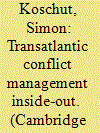

|
|
|
|
|
| Publication |
2014.
|
| Summary/Abstract |
This article explores the impact of domestic norms on regional security practices in a pluralistic security community in the transatlantic area. A security community is considered to be 'a group which has become integrated, where integration is defined as the attainment of a sense of community, accompanied by formal or informal institutions or practices, sufficiently strong and widespread to assure peaceful change among members of a group with "reasonable" certainty over a "long" period of time' (Karl W Deutsch, Sidney A Burrell, Robert A Kann, Maurice Lee Jr, Martin Lichterman, Raymond E Lindgren, Francis L Loewenheim and Richard W Van Wagenen (1957) Political community and the North Atlantic area: international organization in the light of historical experience (Princeton, New Jersey: Princeton University Press)). Recent studies have aligned the concept of security community with the practice turn in International Relations theory. Although practice theory is able to explain peaceful conflict resolution within a security community, this article shows that its explanatory power is significantly weaker when it comes to military interventions outside the security community. The article theoretically and empirically investigates this argument by using the empirical case of extraregional conflict management in Afghanistan. The importance of domestic norms in constructing and perceiving regional security practices in out-of-area operations emphasizes the 'local' over the 'regional' as a crucial driver behind the emergence of a regional actor's understanding of security and thus for the formation and consolidation of regional peace.
|
|
|
|
|
|
|
|
|
|
|
|
|
|
|
|
| 8 |
ID:
132050
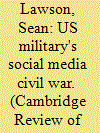

|
|
|
|
|
| Publication |
2014.
|
| Summary/Abstract |
This article uses the controversy within the United States (US) military over the use of social media by individual military professionals as a window into larger debates about the nature of information-age conflict. Information and associated technologies are now central to the US military imaginary. But the controversy over social media is one indicator that the dominant discourse of information-age conflict is neither stable nor total. The introduction of a new technology can serve as an antagonism that turns latent, potential contradictions into substantive differences for policymaking. Thus, though the US military generally has embraced information and communication technologies (ICTs), the introduction of a particular ICT can still be a source of controversy. Military imaginaries, technologies and the relationships between them remain dynamic, contingent and sometimes contentious.
|
|
|
|
|
|
|
|
|
|
|
|
|
|
|
|
|
|
|
|
|